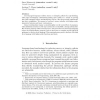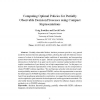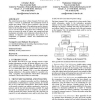378 search results - page 27 / 76 » Programming with Explicit Security Policies |
117
Voted
LISP
2002
15 years 2 months ago
2002
Security-typed languages enforce secrecy or integrity policies by type-checking. This paper investigates continuation-passing style (CPS) as a means of proving that such languages...
114
Voted
OOPSLA
2000
Springer
15 years 6 months ago
2000
Springer
It is essential for security to be able to isolate mistrusting programs from one another, and to protect the host platform from programs. Isolation is difficult in object-oriented...
131
Voted
IJNSEC
2007
15 years 2 months ago
2007
Java programs can be transmitted and executed on another host in bytecode format, thus the sensitive information of the host may be leaked via these assembly-like programs. Inform...
128
Voted
AAAI
1996
1996
Computing Optimal Policies for Partially Observable Decision Processes Using Compact Representations
15 years 4 months ago
: Partially-observable Markov decision processes provide a very general model for decision-theoretic planning problems, allowing the trade-offs between various courses of actions t...
WWW
2004
ACM
16 years 3 months ago
2004
ACM
The current discussion about a future Semantic Web trust architecture is focused on reputational trust mechanisms based on explicit trust ratings. What is often overlooked is the ...



